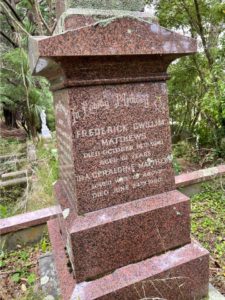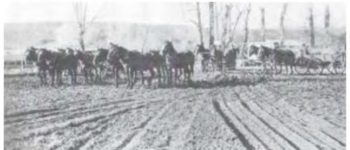1912: Waikeria Prison Farm
January 1, 2021
By AHNZ
 Waikeria Prison Farm (est. 1912) represented a revolution within the New Zealand prison system, the legacy of which still remains today.
Waikeria Prison Farm (est. 1912) represented a revolution within the New Zealand prison system, the legacy of which still remains today.
The new century started off with Boer War Honour Culture and Boy Scout Dignity Culture which were both energetic and prosperous. Whenever New Zealand is doing this well we seek to spend out wealth on social improvements and usually wind up going overboard. The result from c.1907-1912 is what Anarchist History calls Dominion Victimhood Culture, a great epoch (of 5 years) in the history of this country. The name is taken from New Zealand gaining the name/status of a Dominion, as declared by Premier Joseph Ward on 26 September, 1907.
The New Method
The New Method (1909-1924) in penal policy was an offshoot, complimentary to, Dominion Victimhood Culture. The Social Justice Warriors and bureaucrats of their day believed that what prisoners needed was to be treated with respect so they would turn away from their criminality and re-join society as law-abiding citizens. Hence, the new emphasis would be on Correctional Training rather than punishment.
“In parliament, as well as in the public service, there was a flush of enthusiasm, led by Findlay, for ridding the system of its punitive emphasis and replacing it with correctional training.”- p35, Newbold (2007)To “restore self-respect in criminals; to identify the precipitation causes of an offence; and to prescribe a treatment that would stop re-offending.”- ibid
 Ward’s Minister of Justice, John Findlay¹, kicked off The New Method by passing the Crimes Ammendment Act (1910.) Prisons would now put custody and reformation on equal terms. A key man in this reform was Charles Matthews (image left) who was promoted to Controller-General of Prisons in 1912 until his death in 1924.
Ward’s Minister of Justice, John Findlay¹, kicked off The New Method by passing the Crimes Ammendment Act (1910.) Prisons would now put custody and reformation on equal terms. A key man in this reform was Charles Matthews (image left) who was promoted to Controller-General of Prisons in 1912 until his death in 1924.Not long before he died, Matthews gave a speech in which he summed it all up….”Men are punished by being sent to prison, they are not punished while in prison.”² Matthews was born and bred in Havelock, Marlborough, not unlike our famous physicists William Pickering and Ernest Rutherford. However, he was a public servant straight out of school like so many reformists of the Left today.
 Under Matthews, and both Ward’s Liberal and Massey’s Reform ministries, New Zealand came to have a kinder, gentler, prison system. By the ‘gospel of hard work’, especially outdoors, the guests of Her Majesty were given more dignity and reformation opportunities. Prisons gained a more relaxed atmosphere with better lighting, education, and larger libraries. Security became more relaxed too and assaults on staff previously persistent now dissipated. Riots were almost unheard of. It was during this time that Mt Eden sent prisoners out to quarry³ and gained their own school teacher in 1915. General issue of firearms to guards ceased in 1918, some modest wages paid to prison labourers in 1921. The prison garb was changed to remove the Broad Arrow mark government property.
Under Matthews, and both Ward’s Liberal and Massey’s Reform ministries, New Zealand came to have a kinder, gentler, prison system. By the ‘gospel of hard work’, especially outdoors, the guests of Her Majesty were given more dignity and reformation opportunities. Prisons gained a more relaxed atmosphere with better lighting, education, and larger libraries. Security became more relaxed too and assaults on staff previously persistent now dissipated. Riots were almost unheard of. It was during this time that Mt Eden sent prisoners out to quarry³ and gained their own school teacher in 1915. General issue of firearms to guards ceased in 1918, some modest wages paid to prison labourers in 1921. The prison garb was changed to remove the Broad Arrow mark government property.Waikeria Prison was a new beginning, although preceded under The New Method by a young offenders prison at Invercargill in 1910. Waikeria was first in a string of agrarian reform programs followed by Paparua (1914,) Wi Tako (1919,) Hautu (1921,) and Rangipo (1925.) Matthew’s forecast was that “75% of prisoners could be managed like ordinary people” if handled properly and the results he achieved proved him right.
All Good Things
 Matthew’s step forward for New Zealand prisons took two steps backward when he died (It’s almost convenient sometimes how men who obstruct social change happen to drop dead just when it’s expedient for them to do so.) Although New Zealand was now to return to a more authoritarian hand on prisoners history always repeats. When it was time again for benevolent treatment of convicts that work could pick up on the work Matthew’s had left off.
Matthew’s step forward for New Zealand prisons took two steps backward when he died (It’s almost convenient sometimes how men who obstruct social change happen to drop dead just when it’s expedient for them to do so.) Although New Zealand was now to return to a more authoritarian hand on prisoners history always repeats. When it was time again for benevolent treatment of convicts that work could pick up on the work Matthew’s had left off.A prison system for Victimhood and Slave Culture was obsolete by 1924. The remaining Slave Culture had been shocked out of New Zealanders by the Great Wrong War. We were Honour Culture now and in no mood for coddling dissidents. New Zealand turned instead to Bert Dallard to provide a new era in Corrections.
“The men have been holed up in a high-security building since Tuesday, when they lit several fires to protest against poor conditions. The building has since been extensively damaged and the Department of Corrections said it was unlikely to be used again.”“Depending on how much damage has been done, Waikeria may need to close down for a while at least for some repairs. We’ll have to wait and see.”- Waikeria Prison stand-off: ‘We are protesting for a cause’; RNZ, 1 Jan 2021
Waikeria is still a prison today, at least it was last week! According to the reports on the riot that is still going on as I write the place has degenerated into a very inhospitable form of captivity by this point in time.
—
1 Findlay. Not to be confused with the other academic and Lefty Minister of Justice who had a very parallel term of office during the Rowling Victimhood Culture era, Dr Martyn Finlay; Ref. 1973: Labour 3.0 on Justice
2 Evolution of the prison system, Matthews (1923)
3 Today Mt Eden Quarry, The Quarry, is also known as Auckland Grammar School Rockwall⁴, a magnificent feature. The stone, I think, ended up making the roads and is still visible on the curbs of Auckland streets today as a distinctive feature; Ref. Needed
4 This name probably the idea of Auckland Grammar School’s branding department and they hope it will stick
Ref. The Problem of Prisons, Newbold (2007)
Ref. Sudden Death. Mr Charles Matthews. Controller of Prisons; Auckland Star, 1924; Papers Past
Image ref. Waikeria Prison Farm in 1919; Department of Corrections collection; Newbold (2007)
Image ref. Mt Eden Quarry; Aucklandclimber
Image ref. Matthews grave, Karori Cemetary; Friends of Karori Cemetery (3/1/2021); AHNZ Archive 2021
 Like Comment Share
Like Comment Share
Anarchist History of New Zealand: When we look up we feel smaller. When we look level we grow into greatness.





